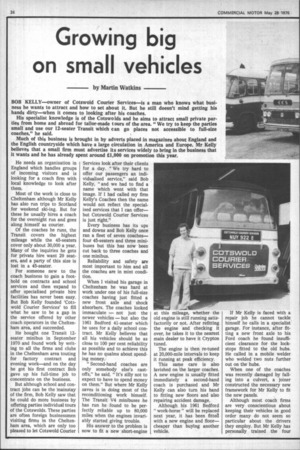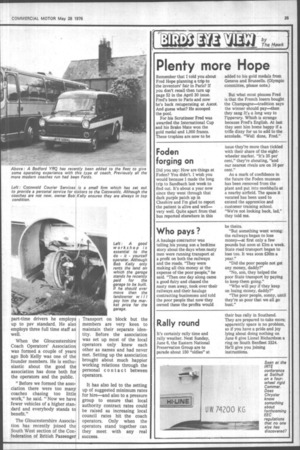Growing big on small vehicles
Page 26

Page 27

If you've noticed an error in this article please click here to report it so we can fix it.
by Martin Watkins
BOB KELLY—owner of Cotswold Courier Services—is a man who knows what business he wants to attract and how to set about it. But he still doesn't mind getting his hands dirty—when it comes to looking after his coaches.
His specialist knowledge is of the Cotswolds and he aims to attract small private parties from home and abroad for tailor-made tours of the area. "We try to keep the parties small and use our 12-seater Transit which can go places not accessible to full-size coaches," he said.
Much of this business is brought in by adverts placed in magazines about England and the English countryside which have a large circulation in America and Europe. Mr Kelly believes that a small firm must advertise its services widely to bring in the business that it wants and he has already spent around £1,000 on promotion this year.
He needs an organisation in England which handles groups of incoming visitors and is looking for a coach firm with local knowledge to look after them.
Most of the work is close to Cheltenham although Mr Kelly has also run trips to Scotland for weekend ski-ing. But for these he usually hires a coach for the overnight run and goes along himself as courier.
Of the coaches he runs, the Transit covers the highest mileage while the 45-seaters cover only about 30,000 a year. Many of the inquiries he gets for private hire want 29 seaters, and a party of this size is lost in a 45-seater.
For someone new to the coach business to gain a foothold on contracts and school services and then expand to offer specialised private hire facilities has never been easy. But Bob Kelly founded 'Cotswold Courier Services' to fill what he saw to be a gap in the service offered by other coach operators in the Cheltenham area, and succeeded.
He bought one Transit 12seater minibus in September 1970 and found work by writing to all the firms and clubs in the Cheltenham area touting for factory contract and evening work—and on the day he got his first contract Bob gave up his full-time job to concentrate on the business.
But although school and contract jobs can be the 'mainstay of the firm, Bob Kelly saw that he could do more business by offering parties individual tours of the Cotswolds. These parties are often foreign businessmen visiting firms in the Cheltenham area, which are only too pleased to let Cotswold Courier Services look after their clients for a day. "We try hard to offer our passengers an individualised service," said Bob Kelly, "and we had to find a name which went with that image. If I had called my firm Kelly's Coaches then the name would not reflect the specialised services that I can offer— but Cotswold Courier Services is just right."
Every business has its ups and downs and Bob Kelly once ran a fleet of seven coaches— four 45-seaters and three minibuses but this has now been cut back to three coaches and one minibus.
Reliability and safety are most important to him and all the coaches are in mint condition.
When I visited his garage in Cheltenham he was hard at work under one of his full-size coaches having just fitted a new front axle and shock absorbers. The coaches looked immaculate — not just the newer vehicles — but also the 1961 Bedford 4I-seater which he uses for a daily school contract. Mr Kelly believes that all his vehicles should be as close to 100 per cent reliability as possible and to achieve this he has no qualms about spending money.
"Second-hand coaches are only somebody else's castoffs," he said. " It's silly not to expect to have to spend money on them." But where Mr Kelly saves is in doing most of the reconditioning work himself. The Transit V4 minibuses he has run he found to be perfectly reliable up to 80,000 miles when the engines invariably started giving trouble.
His answer to the problem is now to fit a new short-engine at this mileage, whether the old engine is still running satisfactorily or not. After refitting the engine and checking it over, he takes it to the nearest main dealer to have it Crypton tuned.
The engine is then re-tuned at 20,000-mile intervals to keep it running at peak efficiency.
This same care is also lavished on the larger coaches. A new engine is usually fitted immediately a second-hand coach is purchased and Mr Kelly can also turn his hand to fitting new floors and also repairing accident damage.
Although his 1961 Bedford " work-horse " will be replaced next year, it has been fitted with a new engine and floor— cheaper than buying another vehicle. If Mr Kelly is faced with a repair job he cannot tackle himself he calls in a specialist garage. For instance, after fitting a new front axle to his Ford coach he found insufficient clearance for the lockstops fitted to the old hubs. He called in a mobile welder who welded two nuts further out on the hubs.
When one of the coaches was recently damaged by falling into a culvert, a joiner constructed the necessary new framework for Mr Kelly to fit the new panels.
Although most coach firms are very conscientious about keeping their vehicles in good order many do not seem so particular about the drivers they employ. But Mr Kelly has personally trained the four part-time drivers he employs up to psv standard. He also employs three full time staff as well.
When the Gloucestershire Coach Operators' Association was formed a couple of years ago Bob Kelly was one of the( founder members. He is enthu-I siastic about the good the association has done both fo the operators and the public.1 "Before we formed the asso-I elation there were too many coaches chasing too littlei work," he said. "Now we have! fewer vehicles of a higher standard and everybody stands to benefit."
The Gloucestershire Association has recently joined the South West section of the Confederation of British Passenger Transport on block but the members are very keen to maintain their separate identity. Before the association was set up most of the local operators only knew each other as names and had never met. Setting up the association brought about much happier working relations through the personal contact between Operators.
It has also led to the setting up of suggested minimum rates for hire—and also to a pressure group to ensure that local authority contract rates could be raised as increasing local council rates hit the coach operators. Only when the operators stand together can they meet with any real success.




















































































